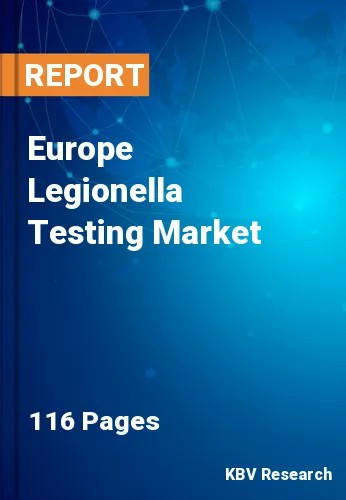The Europe Legionella Testing Market would witness market growth of 9.4% CAGR during the forecast period (2023-2030).
As public knowledge regarding Legionnaires' disease and its related health hazards has expanded, there has been an ascending need for testing methodologies that are both precise and dependable. In addition, stringent regulations and guidelines established by regulatory authorities and organizations require the testing of water systems for Legionella bacteria. Furthermore, the increasing frequency of Legionnaires' disease outbreaks across diverse environments has underscored the criticality of regular testing as a preventive and control measure against the bacteria's transmission. In conclusion, progress in diagnostic technologies, including automated and expedited testing procedures, has enhanced the effectiveness and precision of the testing, thereby propelling the expansion of the market.
Legionella infection is more prevalent among adults aged 50 and above. Consequently, the expanding geriatric population is one of the most significant factors positively impacting the market. Furthermore, an increasing proportion of those with diseases such as diabetes, cancer, kidney disease (HIV), or other chronic conditions who smoke are hospitalized and susceptible to contracting infections. The elevated mortality rate associated with Legionella has generated a heightened need for efficacious diagnostic assays and therapeutic interventions.
According to the European Center for Disease Prevention and Control, Italy, France, Spain, and Germany contributed 75% of the reported cases in 2021. A mere 11% of the documented cases were confirmed by culture. Consequently, the incidence of Legionnaires' disease caused by Legionella species other than Legionella pneumonia is underestimated. A significant proportion of the cases were classified as community-acquired. In addition, the number of cases reported to the travel-associated Legionnaires' disease (TALD) surveillance system increased by 38% compared to 2020. Therefore, the increasing rate of Legionella infection in the region is increasing the demand in the market.
The Germany market dominated the Europe Legionella Testing Market, by Country in 2022, and would continue to be a dominant market till 2030; thereby, achieving a market value of $34,303.4 Thousand by 2030. The UK market is exhibiting a CAGR of 8.8% during (2023 - 2030). Additionally, The France market would experience a CAGR of 10.2% during (2023 - 2030).
Based on Type, the market is segmented into Polymerase Chain Reaction (PCR), Culture Media, Urine Antigen Testing (UAT), Serology, and Direct Fluorescent Antibody (DFA) Test. Based on End-User, the market is segmented into Clinical Laboratories, Hospitals & Clinics, and Others. Based on countries, the market is segmented into Germany, UK, France, Russia, Spain, Italy, and Rest of Europe.
Free Valuable Insights: The Global Legionella Testing Market will Hit $578.9 Million by 2030, at a CAGR of 9.6%
The market research report covers the analysis of key stake holders of the market. Key companies profiled in the report include QuidelOrtho Corporation, Abbott Laboratories, Merck KGaA, Bio-Rad Laboratories, Inc., Thermo Fisher Scientific, Inc., Becton Dickinson and Company, BioMerieux S.A., IDEXX Laboratories, Inc., Eurofins Scientific SE and Qiagen N.V
By Type
By End-User
By Country
Our team of dedicated experts can provide you with attractive expansion opportunities for your business.

